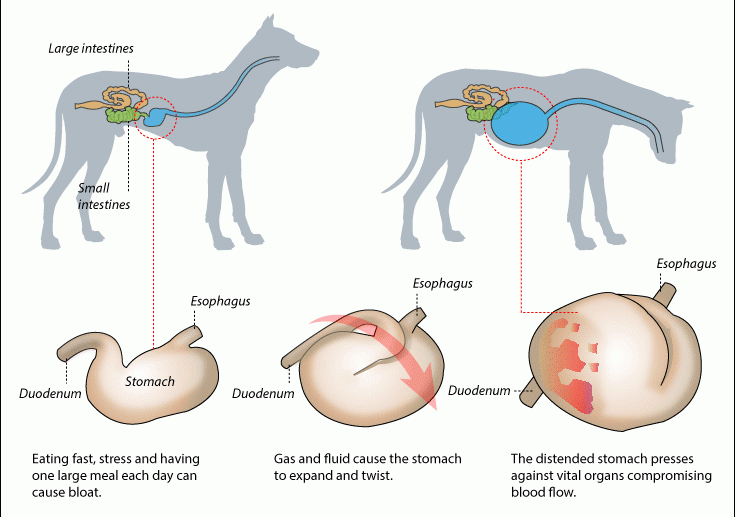
Important: Like all large deep-chested dogs, Greyhounds are susceptible to bloat. This condition is fatal if not treated quickly. Bloating can occur without warning and many owners may mistake it for indigestion. Seek medical attention from your vet or nearest Animal Hospital as soon as possible.
As humans, we all get bloated from time to time. Maybe you have eaten something extra greasy or have an intolerance to a certain food group, your stomach can become bloated, leaving you feeling very uncomfortable. While feeling bloated isn’t a big deal for us, did you know that bloat in dogs can be deadly?
What is Bloat in Dogs?
Bloat, also known as Twisted Stomach or Gastric Dilatation – Volvulus (GDV) is a life-threatening condition that causes the stomach to fill with gases and rotate on itself, cutting off blood circulation.
There are 2 stages to bloat. The first is when the stomach starts to fill with gas, putting pressure on surrounding organs. The second stage is when the stomach becomes so bloated that it compresses large veins and begins to cause the stomach to twist or rotate, cutting off the stomach’s blood supply. Once the blood supply has been cut off, the stomach begins to die which in turn causes the dog’s health to rapidly deteriorate, ultimately ending in death.
Who Is Prone to Bloat
Deep chested and large dog breeds such Greyhounds, Great Danes, German Shepards, Afghan Hounds and Basset Hounds are more commonly affected by bloat.
How Can You Tell Your Hound May Be Suffering From Bloat
There are a few signs you should watch out for if you think that your hound is suffering from bloat.
- A swollen, hard belly
- Drooling
- Persistent lip licking
- Retching but not able to vomit
- Panting
- Restlessness or distress
- Abdomen pain when touched
It is important to note that bloat can happen quickly. In some cases, you may mistake it for indigestion or symptoms may be minimal.
What To Do If You Think Your Hound Has Bloat
Get to a Vet or Animal Hospital urgently. Time is of the essence when it comes to bloat and if the gases aren’t released before the stomach turns the outcome can be deadly. It is also important to note that you should not attempt to relieve your Greyhounds symptoms with over the counter or prescription human medicines.
Causes of Bloat
No one really knows what causes bloat but there have been some behaviours that are exhibited by some dogs that experience bloat. Nervous or high-strung dogs can be susceptible to bloat and there is an indication that stress plays a part in the disease. Dogs that are fed dried dog food in large quantities also may experience bloat more than others. Whether this is due to a food allergy or sensitivity is not known.
Dogs that gulp a large amount of water, and gulp their meals may also experience bloat more than others. Gulping food from the floor rather than an elevated dish can also contribute. It might be due to the additional air that is taken in with the food that causes bloat or some other unknown factor.
Preventing Bloat
While there is no known way to stop bloat from occurring, there are a few things you can do to prevent bloat. These include:
- Using a slow feeder – this will stop your hound from inhaling their food and slow them down enough to make sure they aren’t swallowing too much air. Not sure where to get a slow feeder? Check out the Greyhound Rescue shop!
- Elevate your Greyhounds food and water bowl but ONLY if your hound finds an elevated position more comfortable.
- No exercise one hour before or after eating – give your hound a chance to relax and calm down before having a main meal and after eating to allow food to settle and start to digest.
- Break meals down into smaller portions – if your hound is prone to gulping their food down, even with a slow feeder then try reducing portion sizes and break up meals throughout the day. This ensures the dog is only eating small bits at a time and no extra air is being swallowed.
- Feed a mix of dry and wet food – A diet of dry food only is thought to contribute to bloat as kibble can be easy to swallow and eat fast.
Greyhound Diet to Prevent Bloat
Avoid cheap kibble with high cereal content and take the time to find something more nutritious that takes your greyhound longer to eat. A high quality raw food is great to include in a meal. If you’re not sure of what to feed your hound then speak to your local vet. They will be able to help you create a well-rounded meal plan that is healthy for your greyhound and bloat friendly. Click here to read our blog about feeding your rescued greyhound.

